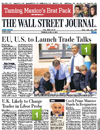For The Wall Street Journal, the announcement of trade talks is the result of months of backroom wrangling by British diplomats, both to secure support for the trade deal and in order to ensure a diplomatic coup for UK Prime Minister David Cameron, as he hosts the G-8 leaders in Northern Ireland. The economic daily writes –

For Mr Cameron, the Transatlantic Trade and Investment partnership (TTIP) is far more than just a trade deal. It is central to his campaign to reconcile the UK to its membership of the EU before his promised referendum in 2017. [...] Mr Cameron is betting that a successful TTIP will substantially reduce the pressure on him to deliver a comprehensive renegotiation of the terms of British membership before 2017. [...] The TTIP offers a politically palatable way for Mr Cameron to put the UK squarely at the heart of Europe, his enthusiastic backing for such an ambitious project helping to undo some of the mistrust caused by his past mishandling of key European relationships.
For Die Welt the agreement on a free-trade zone between the EU and the United States will “mainly be of benefit to the US.” According to a study commisioned by the Bertelsmann Foundation and conducted by the Ifo Institute, which probes the consequences of the the implementaion of a free-trade agreement on 126 states —

for the United States the creation of such a zone will generate 1.1m extra jobs and increase per capita GDP by 13.4 per cent. However, it could be detrimental to non-member countries, because member countries would import less from them. This would harm traditional US trade partners, such as Canada and Mexico, which could see a decline in average per capita income of 9.5 per cent and 7.2 per cent respectively.
Frankfurter Allgemeine Zeitung points out that a further result of an agreement would be reduced trade within the EU —

The volume of trade would decline by 30 per cent between Germany and the countries of southern Europe [...] and by 23 per cent between Germany and France [...] while increasing by a factor of two with the United States. [As a result] the customs union [established by the EU in 1968] would be devalued.
For its part, Tageszeitung shares the concerns voiced by an association of 22 NGOs, which has pointed out that safeguards for consumers will be undermined when European markets are opened up to the US.

Chicken disinfected with bleach, cloned cattle and GM food — all of these are threats to European consumers.
Was this article useful? If so we are delighted!
It is freely available because we believe that the right to free and independent information is essential for democracy. But this right is not guaranteed forever, and independence comes at a cost. We need your support in order to continue publishing independent, multilingual news for all Europeans.
Discover our subscription offers and their exclusive benefits and become a member of our community now!












